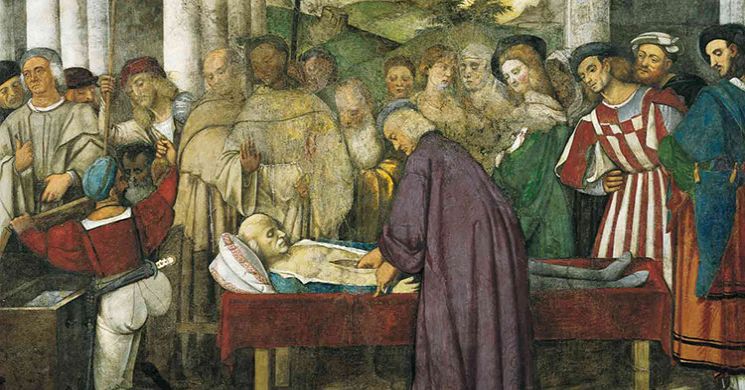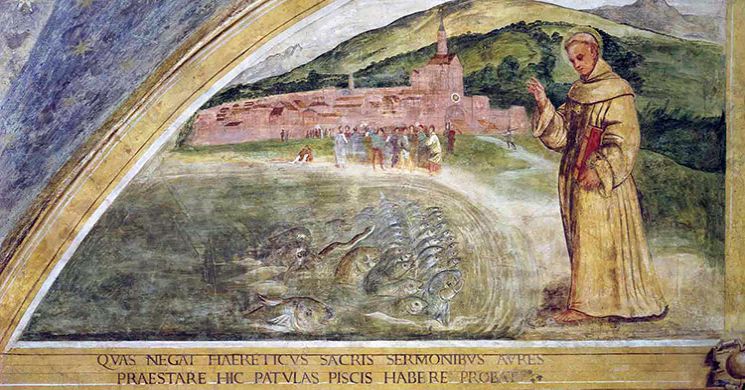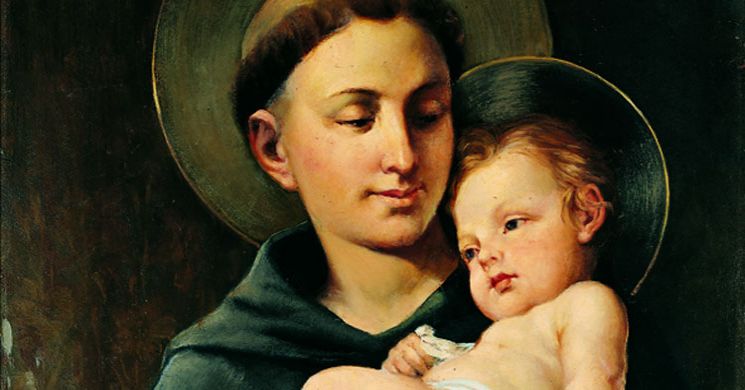Miracle of the Usurer
The great pilgrimages of the late Middle Ages and the Crusades changed this. Slowly people began to trade with more distant lands, and to depend upon goods brought from outside of their world. As trade developed, the cities grew. Simple barter was insufficient, and a money economy developed.
Along with trade and money, there was also a growth of unscrupulous business practices, e.g. usury (the lending of money at exorbitant rates of interest), debtors’ prisons, etc. Anthony, like the other friars, preached a detachment from the goods of this world. They condemned the exploitative business practices of their day, especially usury.
Once Anthony preached at the funeral of a money lender. He told his listeners that they should not bury his body in consecrated ground, for his soul was already suffering the torments of hell. He said that the man’s heart was no longer in his body, but that the Gospel had been fulfilled, “For where your treasure is, there will be your heart (Mt 6,21; Lk 12,34). They opened up the man’s side and found that his heart was missing, but they found it when they opened up his treasure chest.
Ezzelino da Romano
Far from closing himself behind the safe and tranquil walls of an abbey library as he had in his earlier years, Anthony now bore witness to the truth in the corridors of power and in the market places of his world. He proved that the Gospel was alive and relevant to the men and women of his times. The most famous story concerning his political courage involves a certain Ezzelino da Romano. Ezzelino belonged to the political party known as the Ghibellines. Both they and their opponents, the Guelphs, were famous for their conniving and blood-thirstiness, and Ezzelino was considered by all to be a master in the art of treachery. Ezzelino was holding certain Guelphs as prisoners, threatening to execute them. Anthony courageously stood before him and called him to conversion. He repented his ways, only to turn back to his old tricks after Anthony had left.
Miracle of the Fish
Anthony walked along praying and reflecting upon what had happened. As he walked outside of the town, he came to the mouth of the Marecchia River where it flows into the Adriatic. There he began to address the crowds, not of people but of fish.
He called out, “You, fish of the river and sea, listen to the Word of God because the heretics do not wish to hear it.” Suddenly there were thousands of fish neatly arranged in rows, all pushing their heads through the surface of the water as if they were straining to listen to every one of Anthony’s words.
The people of Rimini, seeing this miracle, gathered to listen to Anthony. What began with simple interest in an extraordinary event turned into a passionate conviction that Anthony was speaking to their very hearts. They were so moved by Anthony’s words, by his call to conversion, that they abandoned their hardened positions and returned to the Church. As we stated above, we are not sure that this story is historic, but it certainly does represent a version of what often happened when Anthony preached: that many hardened sinners were converted through the unselfish love of Anthony.
Miracle of the Mule
One day, a heretic told Anthony that he would believe that Christ was truly present in the Eucharist only if his mule bowed down to it.
They established that the test should take place in three days. The heretic starved his mule for the next three days. When the appointed time had arrived, Anthony stood off to one side with the consecrated host in his hands, while the heretic stood to the other holding some fodder for the mule to eat. The mule, ignoring its own extreme hunger, went before the Eucharist and knelt down to adore the Blessed Sacrament.
There are many other miracles associated with Anthony’s ministry, but they should not distract our attention from the fact that most of Anthony’s ministry was performed in simple everyday ways. It was his fervent life style, his prayer, his gentleness, his humble use of his great learning that brought people to conversion. Anthony also ministered to those ministering to others, for he taught theology to the friars in Bologna, Montpellier, Toulouse and Padua. This work and his writings earned him the title of Evangelical Doctor of the Church.
The Baby Jesus
By 1231, the many journeys he had made and the many
illnesses he had suffered had taken their toll. Anthony was suffering
from dropsy, and his strength had all but failed him. All throughout
Lent of 1231 he preached to ever increasing crowds in Padua, but his
preaching and the endless hours of confessions left him prostrate.
Around this time, Anthony had a premonition of his approaching death.
The friars and Count Tiso invited Anthony to go to a hermitage in
Camposampiero, a town not far from Padua, so that he might recover his
strength. Tiso had been one of the unscrupulous politicians seen in the
previous account, but after hearing Anthony preach, he had converted and
had donated the plot of land to the friars upon which the hermitage at
Camposampiero was built.
The ground was damp at this time of year, and it aggravated Anthony’s illness. This problem was solved when the friars noticed Anthony admire an immense walnut tree on the property. They told Tiso about it, and he had a small tree house built in the walnut tree for Anthony.
One night Count Tiso was passing by Anthony’s room when he was attracted by a powerful light. At first he thought that it must be a fire, and so he burst into the room. There he saw Anthony in ecstasy embracing the Baby Jesus. Anthony begged Tiso not to tell anyone about what he had seen, and Tiso respected the Saint’s wishes until after his death.
The ground was damp at this time of year, and it aggravated Anthony’s illness. This problem was solved when the friars noticed Anthony admire an immense walnut tree on the property. They told Tiso about it, and he had a small tree house built in the walnut tree for Anthony.
One night Count Tiso was passing by Anthony’s room when he was attracted by a powerful light. At first he thought that it must be a fire, and so he burst into the room. There he saw Anthony in ecstasy embracing the Baby Jesus. Anthony begged Tiso not to tell anyone about what he had seen, and Tiso respected the Saint’s wishes until after his death.





